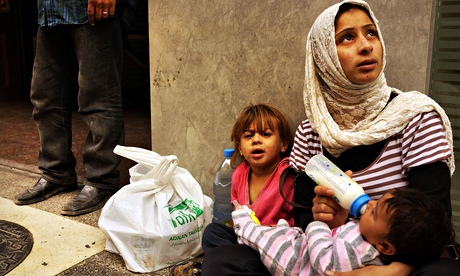
Syrian women who have fled to Lebanon are suffering severe stress and health problems including a high rate of pre-term births and complications among those who are pregnant, according to a study.
Researchers from Yale University say the women, living in north Lebanon and the Bekaa Valley, are not able to access the basic reproductive healthcare they need. Those who are pregnant are not getting antenatal checks, while others have untreated infections.
Some of their health problems are linked to conflict-related stress, which also manifests itself in outbreaks of domestic violence. Some women reported being hit by their husbands and also lashing out themselves at their children, which they afterwards bitterly regretted.
"Anger has spread … If a child moves, we slap them on their face due to our decreased tolerance level. Then, we think, regret what we have done, and ask ourselves 'why did we hit them?'. Yet we feel that we have no more energy to run after them, and so we hit them again and can't control ourselves," one woman told the researchers.
"I feel like I need a psychiatrist. I've been beating my child abnormally, and when he sleeps I regret it and cry, yet the next day I get tense and beat him again," said another.
"My husband works day and night and earns 5,000 Lebanese pounds [£2]. We can't pay rent. We understand that this makes them stressed and let go of their anger on us [through violence], because they have to support us," said a third.
"We are forced to bear our tension, our husbands' and children's tension as well, since we are the ones responsible for the family. And so, we get mad, shout, and sleep. We take two Panadol pills and sleep, waiting for a new day to come," said a fourth.
But while their situation is unpleasant, Amelia Masterson, lead author of the study in the journal BMC Women's Health, said the women support each other in their adversity.
"Though most of the stories we heard from Syrian women were grim, many women were facing hardship with great resilience and strength," she told the Guardian. "Women spoke of helping each other out with basic needs, taking care of children while their husbands were away in Syria, and receiving help or even a place to stay from the local Lebanese population."
One of the women spoke of her gratitude to the people of Lebanon: "Here, they give us hummus, pasta, beans, rice and canned food. We thank them and thank everyone who helped us including the people of Wadi Khaled, as we know they are not responsible for us."
Masterson and colleagues carried out a needs assessment at the request of the UN Population Fund (UNFPA). They interviewed 452 women, aged 18 to 45, who had been in Lebanon for an average of five months. The interviews were carried out at three primary healthcare clinics between June and August 2012, when there were around 48,000 Syrian refugees in Lebanon. The situation is now likely to be even harder than they found, as the numbers have swollen and there are now around a million refugees, around a quarter of whom are women.
The women were not living in camps, but in urban areas where health services were already severely overstretched. In contrast to Syria, in Lebanon patients must pay upfront for any consultation.
Almost a third of the women – 139 – reported having been exposed to violence in the Syrian conflict and almost all of them (95.7%) said the perpetrator was armed. Fourteen of the women said they had been subjected to sexual violence in Syria by an armed person. The numbers may be higher: some women may not have told of their experiences of violence, because of shame and fear of stigmatisation, the paper says. Over a quarter of all those who experienced any sort of violence suffered physical injury and 67.7% suffered psychological difficulties. These women often reported gynaecological problems, including severe pelvic pain and menstrual irregularity among those who were not pregnant.
Half of the women spoke to nobody about their experiences. Over a quarter told their husbands and the rest spoke to people in their community. But most of those exposed to violence (64.6%) did not seek medical care afterwards. The reasons they gave included insufficient money, lack of knowledge, lack of availability and embarrassment. The scarcity of women doctors was an issue. Less than one in ten (9.2%) got any sort of counselling or mental health assistance.
Seventy-three women had been pregnant at some point during the conflict and just under half had delivered, the study says. Among the completed pregnancies, just under a quarter (23.7%) had been pre-term births, four had been miscarriages or induced abortions (10.5%) and one baby died. There were complications in over a third (36.8%), of which the most common was haemorrhage. Of those currently pregnant, over a third (39.5%) of them reported problems such as abnormal weakness and tiredness, severe abdominal pain, bleeding and fever. Most had not received any antenatal care since arriving in Lebanon.
Masterson and colleagues say their findings show a need for more reproductive and mental health services for refugee women in the Middle East.

